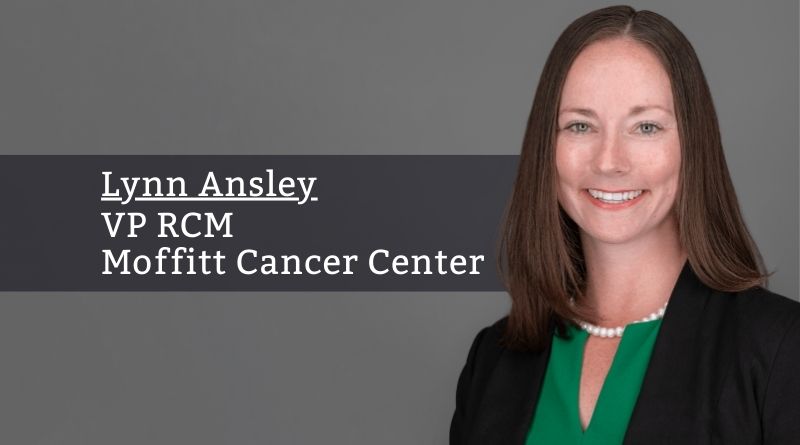A People-First Approach: Optimizing Reimbursement through Engaged Teams
By Lynn Ansley, VP RCM, Moffitt Cancer Center
Aligning professional development and succession planning within revenue cycle management (RCM) begins with getting the right people on “the Bus.” This enhances operational efficiency and accuracy, increases team member engagement, and optimizes revenue capture. Continuous learning and engagement boost employee retention, while effective succession planning ensures leadership continuity and organizational stability. By staying current with regulatory changes, leadership best practices, and technological advancements through curated learning experiences, Moffitt Cancer Center fosters sustainability, innovation, and financial stewardship.
Advantages of Continuous Learning
The dynamic nature of the healthcare finance industry requires a commitment to continuous learning and improvement. With technological advancements, evolving payer requirements, and a multigenerational workforce, staying informed is crucial for optimizing reimbursement. By staying engaged, our teams quickly adapt to shifting demands while delivering superior service.
Effective talent development and succession planning positively impact revenue cycle management.
The benefits of upskilling existing employees cannot be overstated. It enhances their ability to navigate complex processes with confidence and efficiency. Upskilling fosters a culture of empowerment and engagement, boosting morale and retention. When team members are upskilled, they contribute to improved revenue capture and reduced denials. Overall, investing in the development of existing talent not only strengthens individual competencies but also drives organizational excellence.
Bill Arneson, Director of revenue cycle process and systems support, states, “As Moffitt leaders, we are responsible for building the best team possible… I go beyond resumes and identify internal staff who have the technical acumen and interest to thrive in IT roles. Think of it as the NFL draft. Who are the people with raw talent you can coach and grow into a player who can help your team? There are multiple paths to a successful IT career… I love to encourage staff with operational knowledge and interest to learn technical skills and start a new career path for themselves… Currently, six of my team members were operational staff in a different Moffitt department and are now thriving in IT roles…”
Importance of Succession Planning
Succession planning is crucial for maintaining continuity and expertise within an organization. As experienced professionals move on, organizations risk losing institutional knowledge. Succession planning ensures a smooth transition by identifying and developing internal talent to fill critical roles. By proactively preparing successors, organizations mitigate disruptions, maintain efficiency, and uphold high standards of service delivery. Moreover, succession planning fosters a culture of growth and development, motivating employees to excel in their current roles with an eye toward future advancement.
Succession strategies are integrated with our professional development programs to ensure a holistic approach to talent management. First, we provide development opportunities tailored to the needs of the organization. We, then, identify high-potential individuals through performance evaluations and informal assessments rooted in relationships. Once identified, high-potential individuals are offered opportunities, including mentorship initiatives, cross-functional projects, and committee assignments, aligning individual career aspirations within the organizational context. Additionally, discussions occur regularly to track progress, address gaps, and adjust development plans. By aligning succession planning with professional development, we ensure a pipeline of qualified talent ready to assume leadership roles and drive continued success within Moffitt’s revenue cycle.
Cultivating Talent
Cultivating talent involves intentional practices that nurture employees, preparing them to meet current and future challenges. Our approach encompasses several initiatives and partnerships designed to recognize potential, foster growth, and provide continuous development opportunities.
Our methods involve Super Skip Level meetings, a career ladder system, and an IDEAs Committee. With Super Skip Levels, senior leaders engage directly with employees several levels below them, helping identify and support high-potential individuals who might not be on upper management’s radar. The career ladder system offers opportunities for project-based assignments that are progressively challenging, further assessing skills and leadership potential. The IDEAs Committee allows employees to present innovative solutions to challenges, highlighting their problem-solving abilities and nurturing a culture of continuous improvement.
Two programs support engaged and cooperative learning: Revenue Cycle Energy Bus and the Revenue Cycle Leadership Academy (RCLA). The Revenue Cycle Energy Bus bridges gaps and enhances existing competencies with power skills like resiliency, focus, drive, and positivity, supporting teams holistically. Participants learn best practices in areas including human resources, payer strategies, and more. RCLA further engages existing leaders through formal training, mentorship, and interactive workshops, ensuring a robust pipeline of qualified talent ready to assume leadership roles.
Measuring Success
It all comes down to the Cost to Collect, the metric we use to gauge the realization of optimizing reimbursement to find a cure faster. The lower the Cost to Collect, the more money is invested back into cancer research. Intentional education ensures that every revenue cycle team member understands how their work contributes to Cost to Collect and Moffitt’s mission. By fostering a culture of continuous improvement, Moffitt ensures its RCM team remains focused on reducing costs and enhancing revenue capture, directly contributing to the center’s mission of finding a cure faster.
Overcoming Challenges
Every new leader faces a “storm-form-norm-perform” cycle, highlighting the challenges of leadership transitions. Creating networking opportunities and authentic connections among leaders provides support for these challenges, especially in a remote setting. Collaboration with human resources (HR) on our Energy Bus ensures alignment with business needs.
Continuous improvement is a culture we lean into at Moffitt. We approach everything with a “what could be” attitude, even when we have tenured leaders who are occasionally wary of leaning into the uncomfortable.
The people-first approach is more than strategy; it’s the culture that drives our Revenue Cycle Energy Bus. By onboarding the right people and providing continuous development opportunities, we enhance operational efficiency, reduce losses, and optimize revenue capture. Cultivating talent and preparing future leaders ensures seamlessness during leadership change and fosters a culture of innovation. At Moffitt Cancer Center, we believe investing in our people is the key to achieving long-term sustainability and success.



